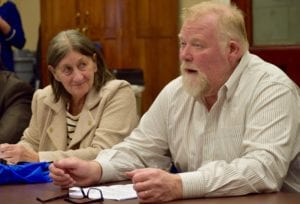Who is a member?
Our members are the local governments of Massachusetts and their elected and appointed leadership.

Mount Washington Selectman Jim Lovejoy discusses the Chapter 90 bond bill at the meeting of the Local Government Advisory Commission at the State House. Leominster Councillor Claire Freda looks on.
Armed with the preliminary results of the MMA’s statewide survey of local road and bridge repair needs, local officials from across the state on Nov. 13 asked the administration for the early filing of a multiyear Chapter 90 bond bill providing at least $300 million per year.
“The key words are early and multiyear and at least $300 million,” said MMA Board member and Mount Washington Selectman Jim Lovejoy during the meeting of the Local Government Advisory Commission at the State House.
The MMA also announced that preliminary results from its biennial statewide Chapter 90 survey indicate that cities and towns need $685 million per year in order to keep local roads and bridges in a “state of good repair,” which is considered the standard in the industry. Nearly 70 percent of the state’s cities and towns have responded to the MMA survey. Based on the surveys that came in, the MMA used several reliable data factors to arrive at a total statewide estimate.
Municipalities are responsible for 30,000 miles of roadways, or more than 90 percent of the public road miles in Massachusetts. The state Chapter 90 program, designed to share gas tax revenues with cities and towns so they can maintain vital infrastructure, has been held flat at $200 million annually for years, while the cost of materials, labor and construction have been rising, creating a substantial gap between the local need and actual funding for the program.
For most cities and towns, Chapter 90 is the primary or sole source of funds for local road construction and repair.
“Truthfully, the level of funding at this point causes most of us to have to save the money from year to year and stockpile it in order to actually have enough money to actually do some of the projects that we need to have done,” Lovejoy told administration officials. “From a municipal perspective, these funds are critically important.”
MMA Executive Director Geoff Beckwith pointed out that additional road funding is a prudent investment.
“In the long run [it] will actually save taxpayers – state taxpayers and local taxpayers – a lot of money because it’s much less expensive to maintain roads once they’re in a state of good repair,” Beckwith said.
He added that a multiyear bill would provide predictability for cities and towns, a significant asset in the local planning process.
The MMA is also urging the administration to file a Chapter 90 bill early – in January along with the state budget – so the Legislature can act quickly and cities and towns can learn of their allocations before the start of the construction season.
Finally, the MMA is renewing its call for the Chapter 90 program to be indexed to inflation, so the funding can keep pace with increasing costs.
Local officials argue that Chapter 90 is a key program to improve quality of life, public safety and economic development in every community across the state. Passage of an adequate, multiyear bill remains a top MMA priority.
Communities that have not yet responded to the MMA’s Chapter 90 survey may still do so by contacting Alandra Champion at the MMA at achampion@mma.org.